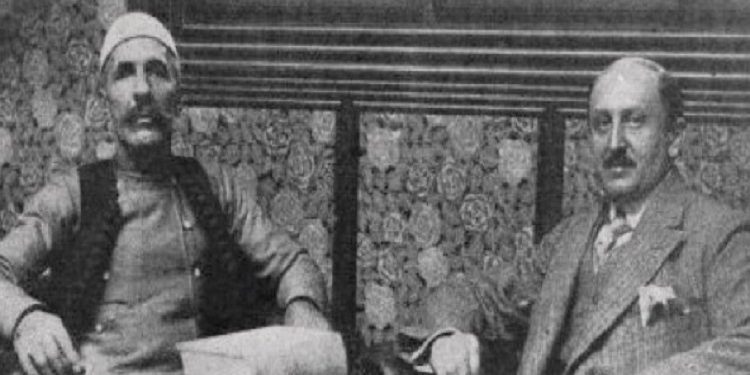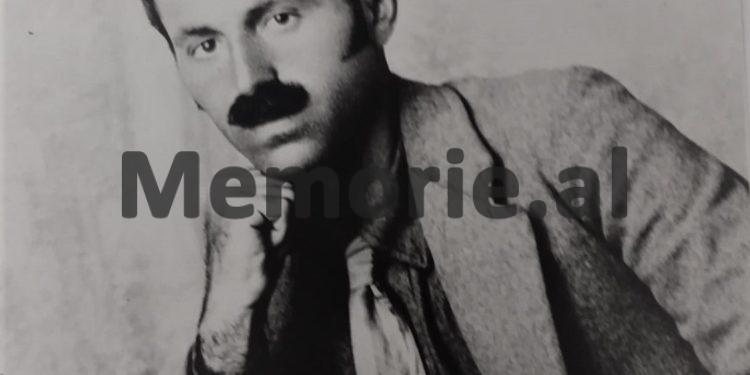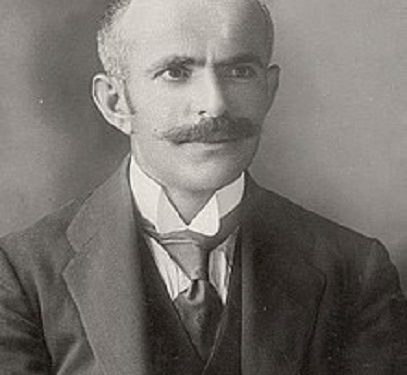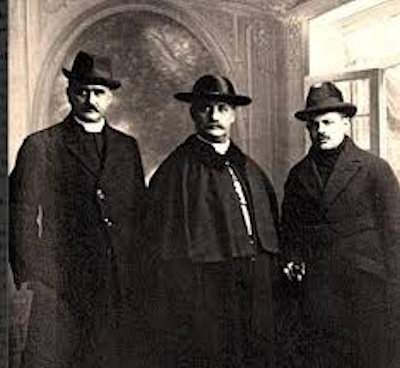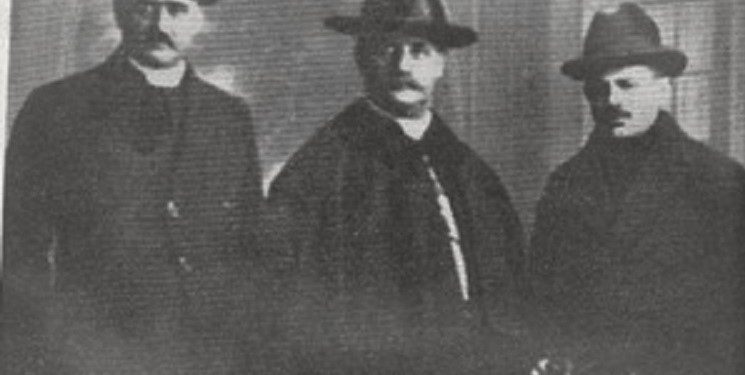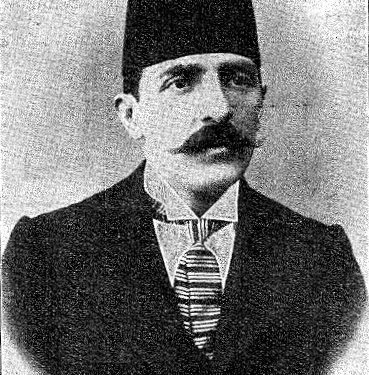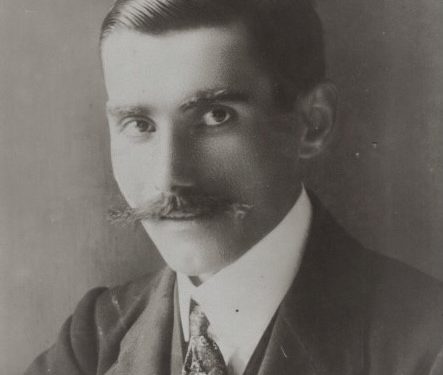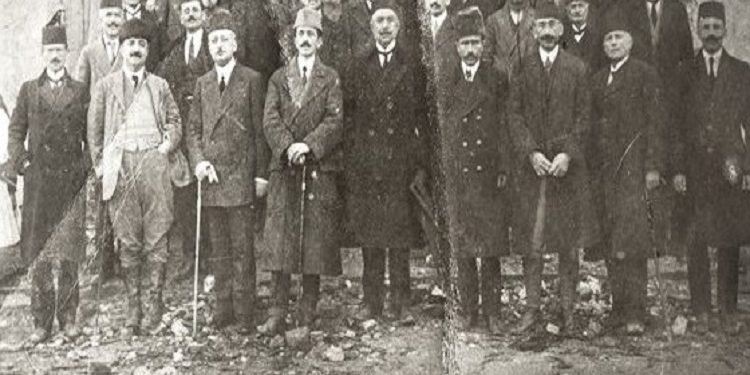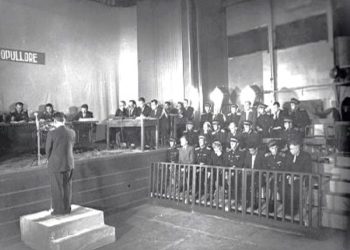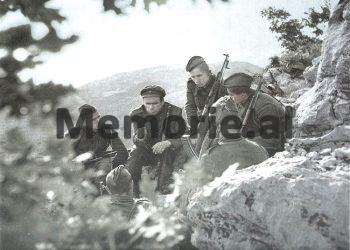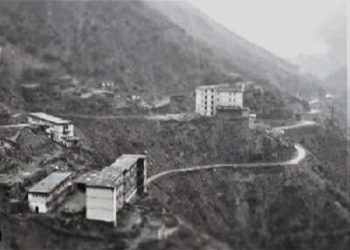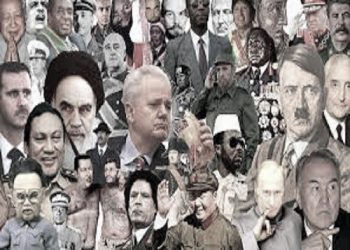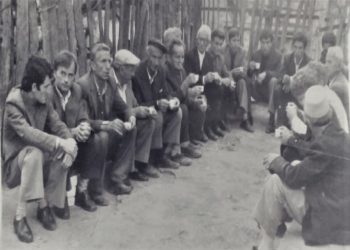By Hamid Gjylbegaj
The third part
HISTORICAL EVIDENCE 1912 – 1925
(Some biographical memories of Hamid Gjylbegaj)
Memorie.al / I were born in Shkodër on March 1, 1888. I received my first lessons in my hometown, in the Turkish, Mejtepe and military schools. I finished the last year of the military gymnasium in Manastir, from where I went to the Military Academy of Turkey, in Istanbul. After finishing school, I was appointed a lieutenant in the Fifth Corps of the 13th Division of the 38th Regiment of Thessaloniki, where I served until October 1912. During this time I fought in Kumanovo, Prelep, Bitola (where I was wounded twice ) and finally in the Castle of Ioannina, in Bizhan, until February 28, 1913. For military actions during the war, as a distinguished officer, I was prematurely promoted to the rank of lieutenant. I entered the military history of the Balkan War as the first officer in the world to discover, on the basis of ballistics science, that the German 7.50 mm field automatic cannons, compared to the French 7.50 mm., were inferior. It was a technical mistake by the Germans, who made the cannon barrels 25 cm. shorter than the French cannons, which later, in the First World War, was also discovered by the Chief of Staff, General Ludendorff. My report on this matter is in the military archives of Turkey. With the surrender of the Ioannina Castle on March 6, 1913, the entire Turkish high command, of which I was also a part, was taken prisoner of war. As a prisoner of war, I spent seven and a half months on the island of Zanta (Zaqinthon). With the signing of the Peace Treaty, in October 1913, I moved to Istanbul.
Continues from last issue
He said: “The death of Isa Buletini in this way is a good thing because it remains as a moral image of Albanian heroism. But, on the other hand, for Albania, a leech was removed that was sucking the nation’s blood, and that was not able to contribute anything. It is good that Bajram Curri also leaves in this way, because they are used to being caught and eaten at Sultan Hamid’s table. These two Kosovo diplomats, without education and culture, who deal with the politics of the Albanian issue, resemble a certain Shaban Aga, a cafe owner in Vučiterna.
When the Katundari came to the city, they returned with coffee, but they were also unshaven, although Shaban Aga was not a barber, he said to them: Come on, I’ll shave you, he sat on the bench, washed them with water and with a razor that he carried in his pocket, he would also take out the cigarette box so that when he was waiting for them, he could smoke. Just like Shaban Aga, these two diplomats of ours have put Albania on the bench and are shaving it by cutting someone’s nose and someone’s ear”. Closing it, Nexhip Begu said to me: “Good luck brother, find out what the Albanian people are and you know how to behave with them”. These were the thoughts of Nexhip Bey Draga. It seems that for these reasons he did not hear about coming to Albania.
At the time I was in Belgrade, Malik Gjyli telegraphed me from Thessaloniki, so that I wouldn’t go there because Esat Pasha was leaving for Paris in 4-5 days and he was sending me the program of his government through General Bardi De Fourtou (French, commander of the allied forces). When he came to Shkodër, the general handed me the program of Esat, which all of us in the committee studied and thought of translating it into Albanian and publishing it in parts in the “Populli” newspaper. However, Sali Nivica insisted on no, saying that we did not need this autocrat’s memorandum, and we had to fight it.
Entry of Italian troops into Shkodër
During the departure from Shkodra, the Austrian troops laid mines in the prefecture building, the Baçallek Bridge and the Buna Bridge. Before this situation, the Albanian officers, already released from the Austrian service, gathered and decided to save and preserve these three objects. Rexhep Shala cut the fuses of the mines in the prefecture and saved it. Even the Buna Bridge was saved, because the Austrian troops did not have time to light the fuses.
Meanwhile, the Italian cavalry regiment had arrived in Lezhë. A family member, Hasan Beg Bushati, sent me a letter informing me that an Italian officer wanted to meet us. Together with him and my grandmother, Alush Gjylbegu, we decided to go to Bushat. After we rode through Buna, up to Blini i Katilina, around the hills of Bërdica, we came to Bushat, where we met the Italian reconnaissance officer at the house of Hasan beg Bushat.
After talking with the officer, we sent a cavalry courier to Lezhë, asking the Italians to send us a company of machine guns. This arrived late at night. We asked the officer of the machine gun company to give us Albanians four machine guns to go, two from Berdica and two from the south of the hills of Berdica, on the bank of the Drin, to shoot the bridge and create panic in the Austrian army. so that you don’t have time to destroy Baçallek’s bridge. But the Italians, like the fools that they are, did not listen to our machine guns and our plan failed. Part of the bridge was blown up. The Austrians retreated without a thorn.
The next day, another person comes and tells us that France and Serbia had entered Shkodër. As soon as he found out, the Italian commander gave the alarm, took the flag and together with the political officers left for Shkodër. They built a temporary bridge over the river Drin and entered the city. After lunch, when the three of us also entered Shkodër, we saw the announcements that the Italian army had distributed everywhere. It was written in them: “After a tough fight, the Italian invading army entered Shkodër and raised the flag in the historical Rozafa castle”. It is worth noting that the French troops, coming from Thessaloniki through the Shala gorge, arrived in Shkodër before the Italian army.
Formation of the government of Durrës (December 1918)
With the formation of the Government of Durrës, the political activity of various groups increased even more. Our “National Wing” committee maintained an opposition position with the Government of Durrës. The National League of Nikol Ivanaj also took the same position. At this time, Mehdi Frashëri, through the mediation of the Italian Consulate in Shkodër, invited me to go to Durrës to form and organize the gendarmerie, which I refused.
The Paris Peace Conference
With the opening of the Peace Conference in Paris, the different political groups inside and outside Albania, each started their own propaganda in the press and in every possible form, for the unification of the Albanian nation. We in the committee were of the opinion to send Mit’hat Frashër to the conference as a representative, but the Government of Durrës, especially Luigj Gurakuqi, expressed the opinion that Mit’hat should not be sent because he was very against Italy.
For this reason Mit’hati was prevented from going to Paris and we as a committee, for political opportunism towards Italy, through General Phillips (English, commander of the international troops in Shkodra 1913 – 1914), were able to get his passport and we sent to Paris, as representatives of the Government of Durrës, Monsignor Luigj Bumçin, Father Gjergj Fishta and Luigj Gurakuqin. They went to Paris around May 1919.
Nikoll Ivanaj went as an individual, and there he collaborated with the “Krahut Kombëtar” group, financially supported by Fuat Dibra. We of the committee corresponded with the comrades who had gone to the Peace Conference in Paris, through General Phillips, so as not to be controlled by the Italians and Serbs. In this regard, General Phillips helped us a lot. And, precisely for this support, Fuat Dibra gave him a gift of 10,000 crowns in Paris. He also donated the same amount, 10,000 crowns, to our committee through Hasan Bektesh.
As we have mentioned above, Esad Pashë Toptani had gone to the Peace Conference in Paris, where he had presented his memorandum, requesting the borders of 1913, and the condition to be recognized by the conference as Prince of Albania. He had this claim as a co-belligerent with the Allies against the Entente, since the Allies won the war.
The murder of Abdyl Ypi
At the time that Esat was at the Peace Conference in Paris, Abdyl Ypi tried to make the meeting of Shijaku in favor of Esat Pasha. This was prevented by our Committee, the “National Wing,” and caused the meeting to fail. After this failure, Abdyl Ypi was forced to join the line of the “National Wing” Committee. On the other hand, Mustafa Kruja, who was the Minister of Posts and Telegraphs in the Durrës cabinet, laid down his arms and forced himself to come to an agreement with the Committee, on the condition that the latter would not cooperate with Esat Pasha Toptani.
On the occasion of the national holiday, November 28, in Durrës, Abdyl Ypi delivered the speech of the occasion. As the great orator that he was, in the line of a true nationalism, his speech was received with great enthusiasm by the people present. Seeing this popular gesture, Mustafa Kruja felt compelled to come out to shake his hand and thank him. But Abdyli did not give him his hand, so Mustafa remained very insulted in front of public opinion. For this reason, the next evening, he ambushed Abdyl and killed him. Mustafa tried to justify himself by saying that Abdyl was killed as an “esatist”. However, this murder made a very bad impression on the people, and the Congress that started to be held in Kruja failed, and we were forced to hold it in Lushnja.
Preparations for the Lushnja Congress
The chairmanship of our Committee, whose actions were directed by Hoxha Kadria, corresponded with Aqif Pashë Elbasan, Ahmet Zogu, Abdi bey Toptan, etc., for the preparation of the Lushnja Congress. I was the courier. According to the instructions of the committee, I moved to Shkodër, Durrës, and Tirana. During this time, when I was doing the work of the courier of the committee in Durrës, I was invited one day by the Italian political officer, Rodi. During the conversation, he offered me 5,000 lira a month to help the “Populli” newspaper, on the condition that we did not write against Italian characters, who were involved in administrative and political actions in Albania. This proposal was discussed in committee and rejected.
On the other hand, in Tirana, Meloni, the Italian consul in Vlora, through Shyqyri Borshi, invited me for lunch one day, to talk about the Albanian issue and the Lushnja Congress that was being organized. During the conversation, he showed me the suspicion that there was a Slavic hand behind the actions that were taken in favor of the Congress of Lushnja. I assured him that it was not about Slavic politics. This action was purely national, supported by England and America, and I asked him that he should try to convince his country of a policy in favor of the Lushnja Congress and respect for the 1913 borders.
After he was convinced, he wrote to his country. The various delegates from Albania gathered in Lushnje on January 21-31, 1920 and took the historic decisions that are known. With the creation of the government that emerged from the Congress, I was tasked with communicating the handover act to the government of Durrës. Fejzi Alizot, a member of the Government of Durrës, was offered to become inspector and general organizer of Albania’s finances, but he did not accept, because he still had hope in General Ferraro (commander of the Italian forces in the Balkans) who was in Vlora. The government of Lushnja finally arrested him.
The murder of Sali Nivica
Sali Nivica was a patriot with high national and social principles. He was part of the “National Wing” branch in Shkodër, where I was the chairman. Through the newspaper “Populli”, he made propaganda for the party and the Albanian nation. With the entry of Montenegro into Shkodër, General Vashoviqi with his agents in Shkodër sought to capture Sali Nivica, but could not find him. For this reason, at night I went and took him from the house where he lived, to Mark Benusi, and took him to my house, from where I took him to Durrës.
Later, after Saliu returned to Shkodër, he resumed his activity through the newspaper. Saliu asked to rent a house near the National Bank owned by Kole Ashiku. For this purpose, Saliu gave Kola an advance payment of 6 napoleons of gold. However, he neither let her house nor returned the money. For this reason, Saliu was forced to sue him to the captain of the French gendarmerie, Veiz. He called both of them to the office for confrontation. On this occasion, Saliu told Kola that; you are not an Albanian son but an Anatolian son. For this, it seems, Kola was insulted and went out and killed him on the road near the Italian Legation. At Salih’s funeral, on January 11, 1920, I delivered the speech of the occasion.
The union of Shkodra with the Government of Tirana (May 1920)
With the formation of the central government in Tirana, quick measures were taken to unite Korça and Shkodra with it. For this purpose, we came to Lezha together with Hoxha Kadri and Ahmet Zogu. I was sent as a representative to the city to negotiate with the administration of Shkodra, promising and assuring them that the central government would allow them to stay in their positions. Musa Juka, as mayor, Malo Beg Mylga as gendarmerie commander and Javer Lutfia, as police commissioner.
They happily accepted the proposal I made to them and entered into cooperation with the central government of Tirana. The Catholic Church was also announced. Security measures were taken for the escort of the French from Shkodra to Yugoslavia, and for the reception of the delegation of the central government of Tirana. I returned to Lezha and announced that the agreement had been reached. Thus, the plan that we had decided before, to stop once in Bushat, to take the necessary measures to enter Shkodër, was broken. We came straight to Bahçallek and entered Shkodër. As a sign of joy, the ringing of the bells of the Catholic churches was heard.
Upon entering Shkodër, we gathered in the Committee to decide on the change of the city’s administration. It was decided to temporarily create a temporary administration which would act for two years on the basis of the Lekë Dukagjini Canon. Sulçe beg Bushati and Shuk Serreqi were elected prefects. The issue of the administration of Puka was also raised. I took it upon myself to deal with it. That’s how I was appointed sub-prefect of Puka.
In Puka
The first thing I did was reconcile the bloods. After a very tiring job, I reached the goal by reconciling 75 bloods. In order to have the situation under control, I had requested from the central government of Tirana, 125 gendarmes. During this time there was a murder which I again reconciled. However, seeing that the government was not fulfilling my request for gendarmes, and when the alliance was in danger of being broken, I considered it reasonable to resign, and I returned to Shkodër.
Battle of Koplik July 1920
This war was provoked by Yugoslav intervention, in collaboration with Albanian bandits paid by Yugoslavia, such as Alush Lohja and Luk Luka and his friends. I was resigned, and I was at home. Qerim Begolli, Xhemal Beg Prishtina, with some 12 Kosovars, come to my house and asks me to help them defend the homeland. As an officer, I had no way to go, because I didn’t have any official duty (I was resigned). After they insisted, I agreed to go as a volunteer.
After we went to the country, the command for directing combat actions passed into my hands. I divided the assembled forces into three main groups. The first group, the right wing, at the foot of the mountains, led by captain Taip Shkodra. The second group, which we can call the middle group, with the gendarmerie of Shkodra led by Hasan Bushati, was placed in the field, on the main road. The third group, the left wing, under my command, which consisted of Kosovar volunteer forces, Shkodra and castrates, was placed at the water’s edge. About 350 people, from Shkodra, I left a reserve group in the center, under the command of Sulçe beg Bushati. Between the reserve forces and the front line, I placed a liaison group of 10 gendarmes under the command of Oso Beg Koplik.
In addition to these forces, we also had two detachments organized, one under the leadership of Deli Meta and Bajram Hysen, operating on the right wing, and the second operating on the left wing from the water’s edge, under the command of Zef Serreq, with volunteers of Kastrat village. With this way of organization, the war in the hills of Koplik began. The left and right wing detachments completed their tasks, and all the front forces advanced to the water’s edge, in front of the Koplik hills.
While we were in this situation, without any orders, the middle group, in the center, apparently with the initiative of Hasan Bushati and Brahim Mandiq, as an advanced vanguard, learned from Koplik’s tap, where they remained prisoners (this matter remained a mystery). While the war continued and progressed, Hasan Beg Bushati with his own forces left the front and returned to Shkodër, spreading word that Hamid Gjylbegaj has entered deep into the front and remained a prisoner, while Taipi has retreated from the roots of the mountains. With this propaganda they presented the lost war.
When I found out about the escape of Hasan Beg Bushati from the Bas of Jakup Ferri, I gave the latter an order to open the volunteers from 25 meters apart from each other, so that they could keep in touch with the right wing where Taip Shkodra was operating, told that the enemy was retreating. I myself, with a fast horse, went to find the intermediate post, where Oso beg Kopliku was, but he had also fled with the gendarmes.
From here I went to the center where Sulçe beg Bushati was assigned with the reserve forces. The forces were in the country but their commander with his supporters and Oso Koplik, had gone hidden as guests in the houses of some people in Vraka. In this situation I quickly returned to the front of the war and sent a letter to the leaders, informing them that the enemy was retreating, and that they should attack from the Koplik fountain.
Despite all the intrigues, the enemy was defeated and the war was won. We could not capture Alush Lohjen and Luk Lukë with their volunteers, due to the betrayal of Hasan Bushati and Brahim Mandić.
From a military point of view, according to the law of a regular army, Hasan Bushati, Oso Kopliku, Sulçe Bushati and Malo beg Mylgashi, had to be executed for treason. But since the state did not have a regular organization, this action of theirs passed as without any harm, as if nothing had happened, since the war was won.
Later, with different stages, the war continued in Thata stream, Shej Mountain and Mukset hills up to the border. After we arrived at the border, I issued a report to the government in Shkodër, explaining that from a tactical, technical and military point of view, we could no longer stay in the position we were in. Therefore, within 24 hours they had to try to make peace with Yugoslavia. Otherwise, the enemy forces bombarded us and destroyed the entire front, because we had no artillery to defend ourselves. So we either had to advance to cross the border and enter the field, or retreat immediately to come to Dry Creek.
After the advance was not made and the enemy attacked us, we were forced to return to Thata creek. The front, under my command, was held and strengthened continuously, until we made peace with Yugoslavia.
Formation of the first regiment of Shkodra
Later, measures were taken to establish the Albanian army. The first regiment was established in Shkodër, with Commander Colonel Ismail Haki Tatzati, commander of the first battalion, Captain Meleq Frashëri, commander of the second battalion, Captain Lytfi Përmeti and commander of the third battalion, Captain Hamid Gjylbegaj.
The Minister of War, Selahedin Shkoza, described this battalion as exemplary for the whole of Albania.
With the formation of the regiment, there was a need for the army to take over the border, because until that time it was held and guarded by the volunteer forces that had participated in the Koplik War, and by part of the country’s gendarmerie. On this occasion, Tatzati, Sylçebegu and Musa Juka called me, because I had also been the commander of the Koplik War. After the volunteers were thanked, the border was handed over to the regular army.
After that, the incident of Ismail Deli Lohje happened, whose brother was killed and he himself was wounded in both legs. This was commissioned by the prefect of Shkodra, Sulçe beg Bushati, to follow and discover the treacherous actions of Alush Lohje and Luk Luke in Podgorica. Even though he was Alush Lohje’s cousin, he had participated in Koplik’s war with the three brothers against Alush, swearing that he would not betray. According to the canon of Leka, if he betrayed you, they would have to be extinguished as a tribe.
The accident happened when he was entering and leaving Yugoslavia. One day when Smajli was in Zogas with a friend of his to arrange a marriage, the aspirants of Marash, the border guard regiment, saw Smajli going in and out of Yugoslavia. They alerted Tatzat, and asked Smail Delia to surrender. He did not accept and they fought with each other. Ismail Delia was killed. His family was forced to take blood, killed Commander Marash and moved to Yugoslavia. Memorie.al
(Prepared by Dr. Shefqet Deliallisi)
The next issue follows




